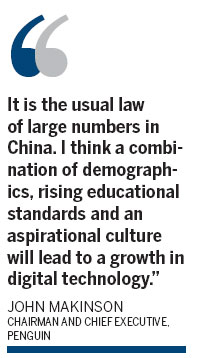Tech
A high-tech leap may put China front and center
By Andrew Moody (China Daily)
Updated: 2010-09-06 08:05
 |
Large Medium Small |
|
John Makinson, chairman and chief executive of Penguin, says: "There is an opportunity for digital publishing because the book retailing market is not as efficient as in some other markets. |
Lack of modern bookstores may make e-reading a public preference
BEIJING - John Makinson, chairman and chief executive of Penguin, a major international publisher, believes China could lead the world in the way people buy books.
The 55-year-old said e-books could take off rapidly in the country because of the lack of modern bookshops.
Book retailing in China comes under the auspices of the Xinhua Bookstore, which in Beijing operates key stores such as the well known Wangfujing Xinhua Bookstore and The Foreign Languages Bookstore.
These are seen by some as staid in comparison to some Western chains such as Barnes & Noble in the United States
"One of the key features of the Chinese market is that the physical book retailing infrastructure is not quite as well developed as in other markets," he said.
"There is an opportunity for digital publishing because the book retailing market is not as efficient as in some other markets. There are few book shops and there are problems in getting early delivery of books," he said.
Makinson, who was speaking in the Kempinski hotel in Beijing on the day Penguin was celebrating five years of setting up operations in China, believes the opportunity for Chinese to read books on devices like the iPad and the Kindle could drag book retailing in China into the 21st century.
"To some extent, it could sort of leapfrog traditional publishing here, just as mobile telephony in some markets has leapfrogged fixed line phone networks," he said.
"You have a relatively conservative publishing and retail culture here while at the same time you have a very large community of book lovers engaged in online activity."
Makinson, a former chief executive of the Financial Times newspaper, said the digital revolution in publishing would be likely to benefit book publishers rather than damage them unlike newspapers, whose business model has been undermined by the Internet.

Penguin, which is part of the Pearson group, increased its sales by 9 percent in the first half of this year to 2.34 billion pounds ($3.6 billion).
"How many newspapers will be saying their sales are going up at that sort of rate?" questioned Makinson.
"With the risk of sounding complacent - for there are certainly worries - what we are proving is the old adage that what drives growth in the market is not changes in consumer demand but making stuff available in more places," he said.
He said the digital revolution was similar to the launch of the paperback, which Penguin itself pioneered in 1935.
"When the paperback was launched the book market grew. The same also happened when books were sold in supermarkets or when on line retailers like Amazon began selling books."
Makinson said those who said people would never read a book in electronic form have been proved wrong by the new reality.
"I remember having these conversations in an office in New York four years ago where people were saying they would never read a book on a device. Now you go on the subway and people are reading books that way all the time," he added.
He said according to industry figures e-books now make up around 10 percent of the total market in the United States and that portion was growing at 300 percent a year.
"We have no idea when it might start flattening out. I think it is heading for at least 20 to 30 per cent of the overall market," he said.
Makinson, a former Reuters and Financial Times journalist who became chief executive of Penguin in 2002, said the company's sales volume had been growing in China by 15 percent a year since it opened an office here in 2005 but would not reveal actual figures.
The company has had notable publishing successes, including Wolf Totem by the Mongolian writer Jiang Rong, which became an international bestseller and was the biggest success in Chinese publishing history.
He maintains that digital publishing is an exciting opportunity for Penguin in China
"It is the usual law of large numbers in China. I think a combination of demographics, rising educational standards and an aspirational culture will lead to a growth in digital technology," he said.
Makinson, who was on his second visit to China this year, said one of the barriers to the growth of digital publishing was piracy, for which publishers were vulnerable until they become "smarter" about copyright protection and encrypting content.
"Digital piracy is a problem here in China. It is a very serious issue," he said.
Makinson, however, believed these problems would be overcome and the Chinese digital market will take off.
"It is a way to connect to this huge audience and with digital you have the opportunity to catch a market many times larger than today," he said.
